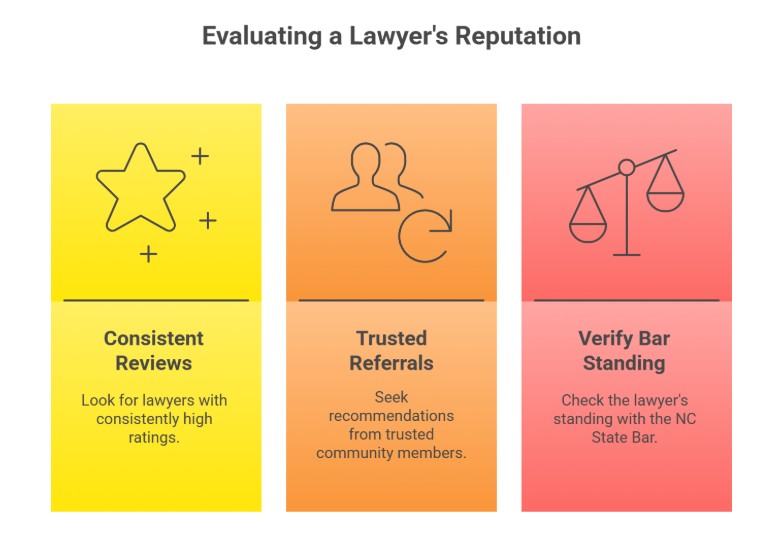

Originally published: October 2025 | Reviewed by Larry Hudspeth

Choosing the right family lawyer in Jacksonville, North Carolina, can feel overwhelming, especially if you’re facing divorce, custody disputes, or other family legal issues.
With so many local law firms serving the area, families have plenty of options—but how do you even start to narrow them down?
The key is to find an attorney with strong local experience in Onslow County courts, a solid reputation, and clear communication skills that fit your needs.
Family law attorneys guide clients through legal matters related to marriage and parenting.
They handle divorce proceedings, child custody arrangements, and adoption cases.
Knowing what to ask potential attorneys and how to check their track record makes a tough situation less stressful.

Finding the right family lawyer involves evaluating their experience in family law, their knowledge of North Carolina’s legal requirements, and their standing with local courts. Those three things can make or break your case.
Experience in family law matters more than general legal practice. If a lawyer has handled hundreds of divorce and custody cases, they know the process inside and out.
Try to find attorneys with at least 5-10 years focused on family law. Jacksonville family lawyers who specialize in this area become skilled negotiators and advocates.
Ask them about their caseload. How many divorce cases do they work on each year? What percentage of their work involves child custody disputes?
Attorneys with lots of experience spot problems early and help you avoid costly mistakes. They also know which judges prefer certain approaches.
New lawyers might charge less, but they may not have the experience to handle complicated situations. Family law decisions can significantly impact your children and finances for years.
North Carolina’s rules for divorce and child custody differ from those in other states. Your lawyer needs to be well-versed in these laws to protect you effectively.
NC requires a one-year separation before you can file for divorce. The state uses equitable distribution for property division, so it’s not always a 50-50 split.
For child custody, North Carolina courts look at the child’s best interests. Judges consider things like:
Ask lawyers about recent changes in NC family law. Laws change, and good attorneys keep up through continuing education.
Local reputation matters. Family lawyers often see the same judges repeatedly, and judges tend to remember who’s prepared and professional.
Check online reviews and ratings. Jacksonville family law attorneys usually have detailed feedback from clients and peers.
Ask other lawyers for referrals. They know which attorneys handle family cases well and which ones to avoid.
Contact the North Carolina State Bar to check for disciplinary actions. This information is a public record and indicates whether a lawyer has violated any ethical rules.
Local court staff and legal professionals form opinions about attorneys over time. A lawyer with a good reputation can often settle cases faster, sometimes without a drawn-out court fight.
Worried about how divorce or custody will impact your future in Onslow County? Hudspeth Family Law provides steady guidance—contact us today to schedule your consultation.
If you’re ready to get started, call us now!

Local family law experience gives you a real advantage in Onslow County. Attorneys who know Jacksonville courts understand the procedures, judge preferences, and the unique needs of military families at Camp Lejeune.
Family law attorneys in Jacksonville, NC, who know the local court system can offer you a leg up. Every courthouse has its own unique quirks, and local lawyers are familiar with the unwritten rules.
Onslow County family courts have their own scheduling patterns and paperwork requirements. Local attorneys are familiar with which judges prefer certain types of evidence and how long cases typically take.
The Onslow County Courthouse procedures can move faster when your attorney knows the ropes. That familiarity means fewer delays or mistakes that could hurt your case.
Key local advantages include:
Jacksonville’s proximity to Camp Lejeune brings unique family law challenges. Military families deal with deployment, moves, and federal benefits—things civilian lawyers might not get.
Local attorneys handle cases involving military pay, housing allowances, and custody changes due to deployment. They know how military life shapes divorce and child support.
Military-specific considerations include:
Civilian families also benefit from local knowledge. Family lawyers in Jacksonville, NC, understand the community dynamics and local employment landscape, which can impact support calculations.
Local experience typically means your case moves more efficiently. Attorneys who are familiar with Onslow County procedures avoid the common snags that can prolong the process and increase costs.
Experienced family law attorneys here know what documents judges want and how to present your case effectively. That helps prevent unnecessary delays or mistakes.
Efficiency benefits include:
Local attorneys also know other family law lawyers. These connections can lead to more productive negotiations and settlements outside of court.
Their knowledge of local court systems and community dynamics enables them to identify problems before they escalate. That proactive approach saves clients time and money.

A family lawyer’s reputation can shape your case and your whole experience. You can check this through online reviews, community referrals, and professional records.
Online reviews give you a peek at how a lawyer really works. Checking a lawyer’s reputation on the web shows you what real clients think.
Key Review Elements to Examine:
Look for five-star reviews with specific details about the lawyer’s help. If reviews sound vague or generic, they might not be legit.
Check for patterns across different review sites. If the same strengths or problems come up again and again, that’s probably accurate.
Recent reviews matter more than old ones. Lawyers change over time as they gain experience or shift their approach.
Personal referrals from friends, family, or colleagues can be gold. Getting recommendations from people you trust gives you honest insight.
Valuable Referral Sources Include:
Ask specific questions about the referral. Was the lawyer easy to talk to? Did they meet deadlines? Were their fees reasonable?
Referrals from people with similar cases are the most helpful. A divorce referral tells you more about custody work than a personal injury recommendation ever could.
If several people recommend the same lawyer, that’s a good sign. However, don’t rely solely on one referral—combine it with other research.
The North Carolina State Bar keeps records of lawyer licenses and any disciplinary actions. Checking this ensures your lawyer is legit and follows professional standards.
Important Bar Information to Review:
Disciplinary actions point to serious issues. One minor infraction might not be a dealbreaker, but repeated violations are a red flag.
If a lawyer’s license is suspended or revoked, they can’t represent you. Always verify that they’re currently licensed before hiring anyone.
The State Bar website makes this info easy to find. Investigating a lawyer’s reputation should always include checking licensing databases for a complete background check.
The right questions can help you figure out if a lawyer has real experience with cases like yours. It’s also the best way to see how they handle disputes and understand their communication style.
When you set clear expectations early, you avoid a lot of headaches down the road. Nobody wants surprises or confusion when their family’s at stake.
Experience with cases like yours really matters. A lawyer who’s worked through 50 divorces will know things a criminal lawyer might not.
Ask for actual numbers. How many custody battles have they handled? What about property division cases?
Asking about their experience and approach helps you see if they’re a good fit for your needs.
Request details about recent cases. Did their last few divorce cases settle, or did they end up in court?
What percentage of their custody cases turn out favorably for their clients? It’s fair to want specifics.
Key experience questions to ask:
The best lawyers answer with real numbers, not just “lots of experience.” If someone gets vague, that’s a red flag.
Some lawyers love the courtroom, while others prefer to settle matters quietly. Understanding their communication style and approach can significantly impact your costs and the duration of the process.
Ask when they recommend mediation and when they push for a trial. A good lawyer will walk you through both options and help pick the best fit for your situation.
Find out how often they settle cases versus going to court. Do they negotiate most of their cases, or do they end up in front of a judge every time?
Questions about their strategy:
If you want to avoid court, pick someone who knows how to negotiate and mediate. Not every lawyer is great at both.
Poor communication just adds stress when you’re already dealing with enough. Clarifying communication responsibilities means you always know who to call for updates.
Ask how often you’ll get updates. Will they check in every week, or only when something big happens?
Discover their preferred method of communication. Are they emailing people, or do they actually pick up the phone? How fast do they usually respond?
Communication expectations to discuss:
Some lawyers respond to you within a day, while others take significantly longer. Choose someone whose style matches what you need.
Arguments over custody or separation can feel overwhelming. Hudspeth Family Law helps families in Jacksonville, NC, find clarity and protect children—schedule a confidential consultation today.
If you’re ready to get started, call us now!
Military families in Jacksonville face challenges that most civilians never encounter. Deployment schedules and potential relocations complicate custody arrangements.
Courts must balance parents’ work demands with maintaining stability for their children. Detailed parenting plans become essential for covering all the bases.
When military parents receive deployment orders or new assignments, custody can quickly become complicated.
Family law cases in Jacksonville require knowledge of both North Carolina state rules and local court procedures.
Deployment Considerations:
Courts typically allow deployed parents to retain their custody rights through family care plans. These plans outline who will care for the children while a parent is away.
Parents have to give 60 days written notice before moving with the kids. The court considers several key factors when determining if a move is acceptable.
| Factor | Court Consideration |
| Distance | Impact on existing custody schedule |
| Reason | Job transfer vs. personal preference |
| Child’s Age | School and social connections |
| Relationship | Bond with non-relocating parent |
Jacksonville families often require flexible custody arrangements to accommodate shift changes, deployments, and extended family networks.
Jacksonville family law attorneys help create custody arrangements that actually fit your life.
Common Schedule Types:
The court considers work schedules, school distance, and the ages of the children before approving any arrangements. If your shifts change frequently, you may need backup plans.
Special Circumstances:
Military training can force temporary schedule changes. Courts often approve right of first refusal clauses, so the other parent gets first dibs before a babysitter steps in.
Specific parenting plans save everyone from fights down the road. North Carolina family law specialists advocate for agreements that encompass all the minor details.
Essential Plan Elements:
Plans should include where and when to meet for pickups and drop-offs. Some families use schools or community centers to keep things neutral.
Technology Provisions:
Modern plans cover social media, cell phones, and video calls. Parents need to agree on sharing photos online and keeping an eye on their kids’ digital lives.
Modification Process:
Life changes, and plans need to change too. Courts allow you to update agreements if something significant changes, such as a new job or changes in your children’s needs.
N. Lawrence Hudspeth III stands out as a board-certified family law specialist with more than 35 years of experience.
His firm assists both military and civilian families and is well-versed in the local community.
The N. Lawrence Hudspeth III law firm specializes in family law cases. That focus means they handle the tough stuff with real expertise.
Core Practice Areas:
The firm serves both military and non-military clients across Onslow County. That’s a big deal in a military-heavy area like Jacksonville.
Hudspeth earned his board certification from the North Carolina State Bar Board of Legal Specialization back in 1989. Only lawyers who meet tough requirements get that title.
They handle cases across Onslow County and nearby areas. That local court experience can be a real advantage during negotiations and in the courtroom.
Clients give high ratings for the firm’s work. Reviews repeatedly mention a few things.
Josh Sprague, ★★★★★ — “Handled my divorce and custody case exceptionally from start to finish… highly knowledgeable, confident, passionate… ethical, honest, and driven to get the best result.”
Gennifer Bowers, ★★★★★ — “Phenomenal job… attentive, compassionate, humble… believed in me when no one else did. Forever grateful—he’ll be our lawyer and friend for life.”
Richard A. Briseno, ★★★★★ — “Very thankful for the legal assistance… made my divorce much easier to go through. Thank you for all your help.”
Sherry Hatcher, ★★★★★ — “Very nice and knowledgeable attorney. Highly recommend for anyone needing a family attorney.”
Sherry Hatcher, ★★★★★ — “An amazing attorney… very knowledgeable and caring. I highly recommend his services. 100%.”
Hudspeth has practiced law in North Carolina for over 35 years. That’s a serious commitment, and it really demonstrates his deep connection to the local community.
His Jacksonville office, located at 814 New Bridge Street, sits right in the heart of the city. Clients can easily stop by, which just makes everything less stressful.
The firm is familiar with local court procedures and judges. This kind of familiarity definitely helps when representing clients in Onslow County courts.
Local Advantages:
Jacksonville’s military community gets special attention from Hudspeth’s practice. He understands the unique challenges that military families face during legal proceedings.
His strong reputation in the area draws referrals from other professionals. Local connections make it easier to support clients from every angle.
Don’t face divorce or custody battles alone. Hudspeth Family Law stands with Onslow County families when everything feels uncertain—contact us now to schedule your consultation.
If you’re ready to get started, call us now!
How do I choose the right family lawyer in Jacksonville, NC?
Look for experience in North Carolina family courts, clear communication, positive client reviews, and services that fit your needs, such as divorce, custody, or mediation.
Why does local experience matter in Onslow County family law cases?
Local experience ensures your attorney understands how judges in Jacksonville and Onslow County handle divorce and custody disputes, which can influence strategies and outcomes in your case.
What should I ask before hiring a family lawyer?
Ask about their experience with cases like yours, how they approach mediation vs. litigation, expected timelines, fees, and how they’ll communicate with you during the process.
How much does a family lawyer cost in Jacksonville, NC?
Costs vary depending on the case’s complexity, but most lawyers charge by the hour. Clear fee agreements up front help you budget and avoid unexpected expenses during your case.
Do I need a lawyer for child custody in Onslow County?
Yes, custody disputes often involve complex laws, relocation issues, and parenting schedules. A lawyer helps protect your parental rights and ensures agreements are legally enforceable.
Can a family lawyer handle a military divorce in Jacksonville, NC?
Yes. Family lawyers in Onslow County, including Jacksonville, frequently work with military families. They address deployments, pension division, and custody challenges unique to service members.
What’s the difference between a divorce lawyer and a family lawyer?
In North Carolina, a divorce lawyer specializes in separation and divorce, while a family lawyer handles a broader range of issues, including custody, mediation, and post-divorce modifications.
Where can I find trusted family lawyer reviews in Jacksonville, NC?
Reviews on platforms like EasyReviewSite show client experiences. Hudspeth Family Law is consistently praised for honesty, clarity, and results by families in Onslow County.